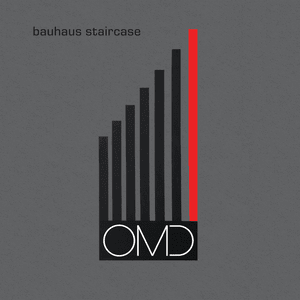I do not believe that Bauhaus Staircase is a great album because Orchestral Manoeuvres in the Dark (a.k.a. OMD) are my favorite band. OMD are my favorite band because they still make great records like Bauhaus Staircase. If it were anything but brilliant, I’d be the very first person to tell you.
Several of their contemporaries, including Tears For Fears, The Psychedelic Furs, and Depeche Mode, have released fine albums in the past year or so. However, Andy McCluskey and Paul Humphreys, OMD’s core members, have landed light years ahead of the pack with their fourteenth studio album.
The band’s career can be divided into four distinct phases. The early albums: Orchestral Manoeuvres in the Dark, Organisation, Architecture & Morality, and Dazzle Ships. The latter derailed them somewhat, as fans found (mistakenly) they had become too delf-indulgent. Next came the American phase: Junk Culture, Crush, and The Pacific Age. Before that last album, they wound up with their only top-10 hit in North America, the wistful “If You Leave” from the soundtrack of Pretty in Pink. The band tried, but failed, to break America. Instead, as they later lamented, America broke them. A high-profile slot opening for Depeche Mode on the iconic 101/Music for the Masses tour found them, at the end, not only broke but heavily in debit to their record company.
OMD split-up. Three of the four members, Paul Humphries, Martin Cooper, and Malcom Holmes, formed a new band called The Listening Pool. They made one album. Andy McCluskey soldiered on as OMD and made three albums in the 1990s before calling it quits and moving on to produce Brit girl-pop act Atomic Kitten.
In 2008, on a whim, McCluskey asked Humphries if he wanted to go to Germany and be on a TV show OMD had been invited to perform on. That’s all it took. The group has now been reunited longer than the time they were together the first time around.
Bauhaus Staircase is the fourth album in the Mark IV/reunion era. It fits nicely alongside its three predecessors and is a very even album. The title track, which is also the lead single, sets the table nicely. Not as strong as recent singles such as “Metroland,” “Night Café,” “Sister Marie Says,” or “The Punishment of Luxury,” it is very ear wormy and really sinks into your consciousness. The band throws in a ringer later in the album with a song called “Don’t Go,” which previously appeared on the band’s singles box set released in 2019. Positively brilliant, it’s a welcome addition and perhaps their best song of the reunion era.
One of the reasons the band split up in 1989 is because they felt they ran out of things to say. In the 21st century, that doesn’t seem to be an issue, as McCLuskey’s lyrics examining everything from anthropology to the social and political chaos of the U.S. and Western Europe.
“Look at You Now,” though, sounds more familiar in theme and execution and is a very Paul Humphreys-sounding track, according to McCluskey. However, the latter handles the vocals. It fits in very well with the bands 80s output without sounding dated.
In the years since the band reformed, they’ve been hailed (rightly so) as pioneers, with particular attention paid to early albums like Architecture & Morality and Dazzle Ships. The former is widely viewed as their best album. The latter, at the time of its release, was deemed too experimental and needlessly self-indulgent. It’s since been praised for its brilliance.
To that end, many Dazzle Ships-like tracks appear on the last few albums. Sometimes it works (“Atomic Ranch”), and sometimes not so much (“La Mitrailleuse”). On the new one, though, the experimental bits are folded in.
“G.E.M.” is very reunion era OMD complete with punchy hook, effects on the background vocals, and sounds common to the later albums. Sonically there is an overall arc between 2008’s History of Modern through to Bauhaus Staircase. That’s because the McCluskey and Humphreys wanted to avoid what they call the “tyranny of choice.” In other words, they chose a pallet of sounds and stuck with them.
That isn’t to say they didn’t reach back for some favorite sounds. “Aphrodite’s Favorite Child,” for example, features choral bits reminiscent of Architecture & Morality. Vocal passages seem to be a favorite these days as heard on “Anthropocene” and “Evolution of Species.” These are reminiscent of the Sugar Tax era when McCluskey was in sole command.
Computerized voice overs are still a favorite in this era as well as evidenced by “Anthropocene,” about the decline and eventual fall of the human species. Similarly “Evolution of Species” covers similar ground. For high-tempo socio-political commentary, without voice overs, there’s “Kleptocracy.”
Shockingly, this isn’t on any year-end best albums of 2023 lists that I’ve seen and even favorable outlets like BBC Radio 2 and BBC 6 Music have given it little time, while inferior albums by OMD’s peers have gotten much airplay.
PF Wilson has been writing about music, TV, radio, and movies for over 20 years. He has also written about sports, business, and politics with his work appearing in Cincinnati CityBeat, The Houston Press, Cleveland Scene, Cincinnati Magazine, Cincy Magazine, Atomic Ranch, and many more. Check out his podcast PF’s Tape Recorder available from Podbean or in iTunes.

